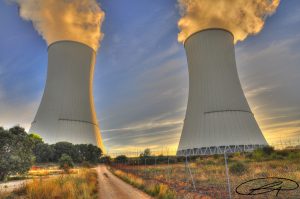
Oklahoma Corporation Commissioners could possibly launch a study of nuclear power in the state as they meet Wednesday at the Capitol.
In their 1:30 p.m. meeting, they will consider a vote on a proposed “Inquiry of the Oklahoma Corporation Commission to Study the Technical and Legal Feasibility of Nuclear Energy Generation in Oklahoma,” according to the agenda released on Tuesday.
The proposal came after the implementation of a law approved in the recent legislative session and following a late July non-public meeting by the commission.
The new law, based on Senate Bill 130 authored by Sen. George Burns, R-Pollard, was signed by Gov. Kevin Stitt and directs the Corporation Commission to commission a comprehensive feasibility study on nuclear energy generation in the state.
As stated in a June announcement by the state Senate, “SB 130 requires the Commission to initiate a contract with an external firm within 90 days of the bill’s effective date. The study will assess both technical and legal aspects of implementing nuclear energy production in Oklahoma. The process will bypass traditional state procurement requirements and instead follow procedures typically used to retain expert witnesses, ensuring timely and specialized evaluation.”
“The potential for nuclear energy in Oklahoma is a conversation that’s long overdue,” said Sen. Burns in the June announcement. “This study will give us the data we need to make informed decisions about energy diversification, reliability, and long-term sustainability for our state.”
The measure was carried in the House of Representatives by Rep. Brad Boles, R-Marlow.
“I want to thank the Governor for signing Senate Bill 130 into law as well as Sen. Burns for his help in the Senate getting this bill across the finish line, which aligns with President Trump’s national energy policy that promotes nuclear energy as an additional source of energy to add to our national energy portfolio,” Boles said.
“Senate Bill 130 directs the Oklahoma Corporation Commission to do a nuclear energy feasibility study for our state. A nuclear energy feasibility study is a critical first step for any state exploring this industry, which we hope will provide a comprehensive analysis of the risks, costs and benefits, ensuring that decisions about our state’s energy future are based on solid data and research.”
The Commission will also be tasked with collaborating with retail electric suppliers and municipally owned utilities to provide essential data for the study. Findings must be submitted to the President Pro Tempore of the Senate, the Speaker of the House, and the Governor within nine months of the bill’s effective date.
Below is the full agenda for the Corporation Commission’s meeting on Wednesday.
A. Call to order
B. Announcement concerning public notice
C. Determination of quorum
II. Approval of minutes of prior meeting(s)
III. Consideration of and possible vote(s) on proposed or potential orders in cases on the daily signing agenda docket. The Commission may discuss and consider alterations, revisions, or amendments to the proposed or potential orders. (Votes may be taken on individual cases, on the daily signing agenda docket as a whole, or both by individual cases and the remaining docket. The vote on daily signing agenda cases may be combined with the vote on 24-hour signing agenda cases.)
IV. Consideration of and possible vote(s) on proposed or potential orders in cases on attached 24-hour signing agenda docket. The Commission may discuss and consider alterations, revisions, or amendments to the proposed or potential orders. (Votes may be taken on individual cases on the 24-hour signing agenda docket as a whole, or both by individual cases and the remaining docket.)
V. Discussion of and possible vote(s) on a Public Utility Division Staff recommendation to issue a Notice of Inquiry that would be numbered and captioned as GD2025-000004, In re: Inquiry of the Oklahoma Corporation Commission to Study the Technical and
Legal Feasibility of Nuclear Energy Generation in Oklahoma
VI. Briefing of recent activity impacting the Commission’s Public Utility Division, including administrative, staffing, legislative, and budget updates — Director of the Public Utility Division, Mark Argenbright
VII. New business
A. Any matter not known about and which could not have been reasonably foreseen
24 hours before the meeting
B. Possible vote(s) on matters of new business
VIII. Adjournment

